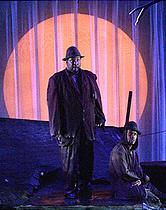SITE GUIDE
REVIEWS
FEATURES
NEWS
Etcetera and
Short Term Listings
LISTINGS
Broadway
Off-Broadway
NYC Restaurants
BOOKS and CDs
OTHER PLACES
Berkshires
London
California
DC
Philadelphia
Elsewhere
QUOTES
On TKTS
PLAYWRIGHTS' ALBUMS
LETTERS TO EDITOR
FILM
LINKS
MISCELLANEOUS
Free Updates
Masthead
A CurtainUp Review
Waiting for Godot
By Liza Zapol
|
What do we do now that we are happy? --- Estragon Wait for Godot. --- Vladimir |

Wendell Pierce & J Kyle Manzay In Waiting for Godot
|
To set Beckett's Waiting for Godot in the world of the Hurricane Katrina aftermath is the bold and clever choice of the Classical Theatre of Harlem. While set designer Troy Hourie's water-world may be the bane of the actor's existence (when they fall in, they are torso high in water), it makes for a relevant adaptation of the play.
Placing this classic in a racial framework is not new. There have been several controversial and successful productions in the past with racially mixed casts. The play's ever extant themes of isolation, invisibility and existentialism become increasingly layered with a racial framework. Add to this the political and social framework that surfaced from the urban apocalypse of Hurricane Katrina, and Beckett's work could become increasingly significant to a modern audience.
On the night this reviewer saw Godot, it was in the midst of a thunderstorm above Harlem -- indeed the lights went out during a power surge before the play began, and there was water dripping from a hole in the roof into the pool onstage. Once the lights were restored, the play began. Estragon's foot emerges from a hole in the roof, and his body follows. A promising beginning to prepare the audience for this absurdist, existential play.
Classical Theatre of Harlem mainstay J Kyle Manzay, with his stringbean body and youthful looks, plays a trickster Estragon, teasing and joking with veteran performer Wendell Pierce's Vladimir. This playfulness is at first fun, but becomes tiresome. While this does bring an awareness of the dramatic potency of the role, (Manzay keeps a Brechtian distance, not really identifying with the character), it diminishes the potential significance of his interaction with Vladimir. His trickster stance prevents the audience from believing him as he seems to be playing at Beckett, and not with the other actors.
Wendell Pierce brings the necessary gravitas and innocence to the role of Vladimir. His portly body, musical voice, and careful craft land this character in the desperate and sad world of Beckett's wasteland and the Katrina aftermath. Pierce is always very good, but as Vladimir he tends to rush, preventing moments for breath or thought. He is best when he is most actively present: in the Vaudville/ hip-hop moments of dancing and singing and when he is speaking to Godot's boy in the Second Act. Godot's boy is played by Tanner Rich, a white teenager who speaks from the audience, which makes Pierce more open to those behind the fourth wall.
The entrance of Lucky and Pozzo is always welcome relief to the vagabonds and to the audience. Chris McKinney, as the ostentatious Pozzo, gives a tour-de-force performance. He's afloat a yellow inner-tube dragged from a rope tied around the neck of Billy Eugene Jones' Lucky. Lucky carries all of their belongings in a USPS white plastic box, on his head. The master/ servant relationship is disturbing and entertaining, freshly performed and cleverly staged.
There are brilliantly theatrical, existential moments when the outside thunderstorm became a part of the play. The men looked up, but there was no rain, in the theatre, no relief from the endless boredom of waiting. This pure desparation, loneliness, and isolation, seen in relief with the aftermath of Hurricane Katrina, could have made this play a beautiful lament. Unfortunately, it becomes more of a jumble. Given more pared down performances and direction, this productioncould have become more simple, and more (in)significant. As Vladimir says, in the Second Act, "This is becoming really insignificant", while Estragon responds: "not enough."
| WAITING FOR GODOT Playwright: Samuel Beckett Directed by Christopher McElroen Cast: Wendell Pierce, J. Kyle Manzay, Chris McKinney, Billy Eugene Jones, and Tanner Rick Set Design: Troy Hourie Costume Design: Kimberly Glennon Lighting Desigh: Aaron Black Running time: 2 hours, with 10 min intermission The Classical Theatre of Harlem, Harlem School of the Arts, 645 St. Nicholas Ave (at 141st St.) SmartTix 212-868-4444 From 5/18/06 to 6/25/06 Wednesday to Saturday at 8 pm, Sunday at 3 pm. Tickets: $35 Reviewed by Liza Zapol based on 6/01/06, 8pm performance |
The Internet Theatre Bookshop "Virtually Every Play in the World" --even out of print plays

Easy-on-the budget super gift for yourself and your musical loving friends. Tons of gorgeous pictures.
Leonard Maltin's 2005 Movie Guide

6, 500 Comparative Phrases including 800 Shakespearean Metaphors by our editor.
Click image to buy.
Go here for details and larger image.








